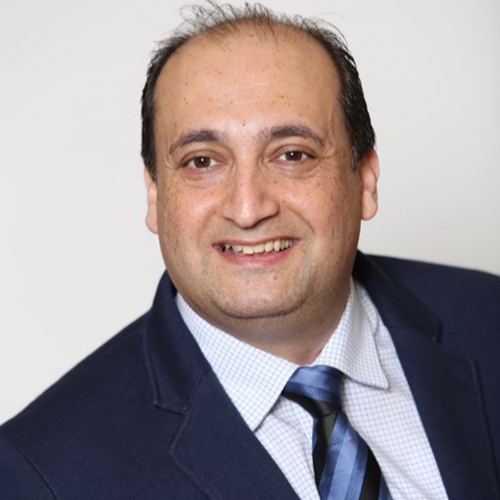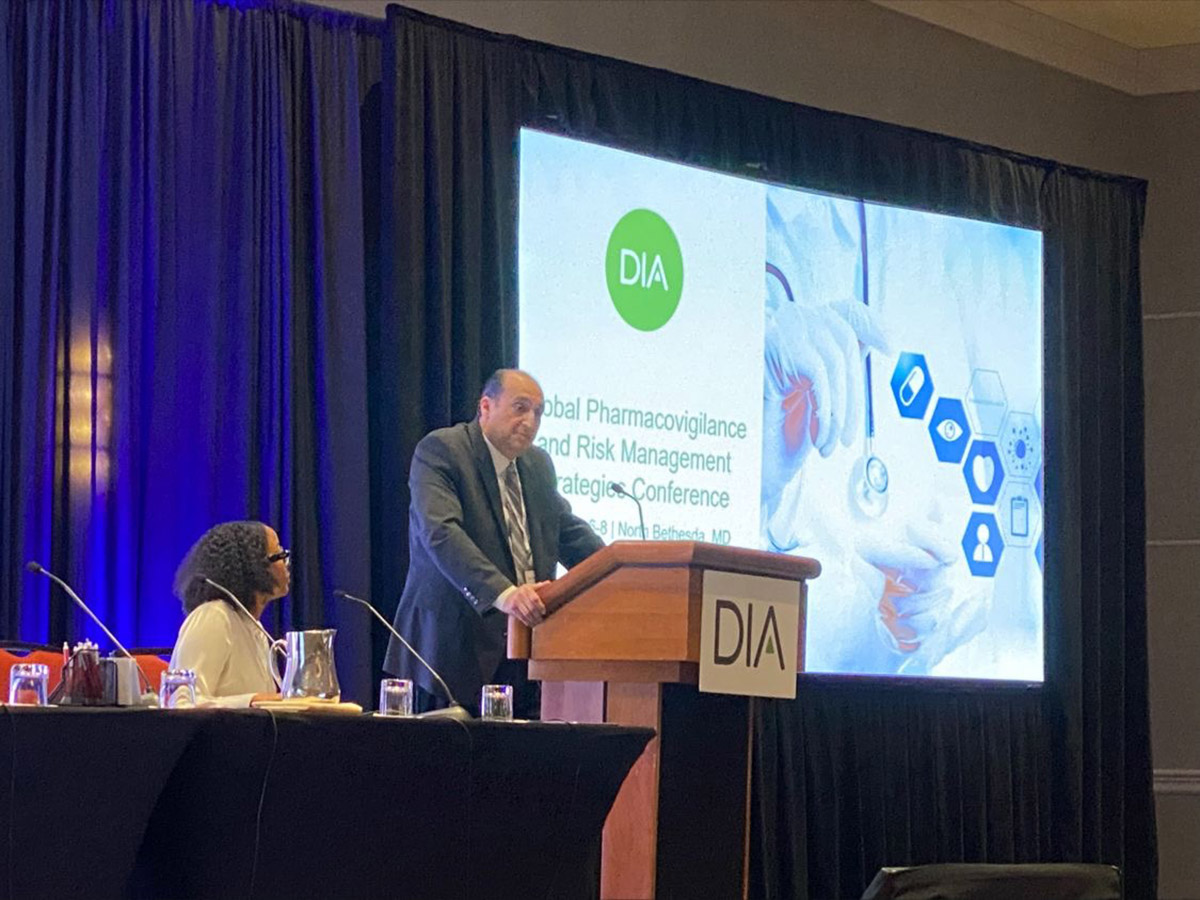
Leave Your Legacy:
New DIA GCE Marwan Fathallah


n January 30, DIA announced that it had named Marwan Fathallah as President and Global Chief Executive. Mr. Fathallah will lead the organization to help drive thought leadership and innovation in therapeutic development to improve the health of people worldwide. Marwan took time from his onboarding schedule for this Q&A with Global Forum Editor-in-Chief Alberto Grignolo.
Alberto Grignolo (DIA): Welcome to DIA, Marwan. Thank you for this interview in the early stage of your DIA tenure. Let’s start by getting to know you: What attracted you to DIA and to the role of Global Chief Executive?
Marwan Fathallah: I’m delighted to be part of the DIA family. It’s a fantastic organization. What attracted me to it was the mission and what DIA can ultimately do for patients, because I genuinely believe that at the end of all this fantastic effort by industry, regulators, academia, and DIA, there is a patient counting on all these pillars to work closely together for the sake of advancing healthcare for everyone.
I’ve been in the life science industry for 30 years and tell everybody that there is no better industry to be in because the work we do ultimately benefits patients, and we’re all patients at one time in our life. There’s benefit to all of us. I have experience in drug delivery, medical devices, and diagnostics, and have run research and development, manufacturing, medical, regulatory, quality, clinical, and scientific affairs. I’ve had the benefit of being on all sides of the equation and can draw on that to think about solutions.
DIA exists to problem solve and then sustain whatever we solve. DIA’s mission to bring us all together to problem solve for the greater good of humanity, to advance healthcare, is a unique opportunity. That’s the legacy I’d like to leave on this earth.
DIA: As the new global chief executive of DIA, what elements of your experience prepared you for, and what strengths do you bring to, this position?
Marwan: I’ve been very fortunate to engage on a global level, whether it’s with regulators, customers, patients, or payers. I also was very fortunate to have done my MBA at Northwestern’s Kellogg School of Management, driven by a boss who wanted me to get more into the commercial side, so I could appreciate things not just from the human element but also from the business element. The fact that I’ve been on all sides of the equation helps me shape strategy. One of my objectives is looking at DIA now and DIA in the future, pulling on my strengths, and then more importantly, strategy and execution, which are the areas I enjoy the most: executing a strategy to bring an idea to life.
DIA: Any early thoughts on how to take this global DIA organization to another level in the future?
Marwan: During the interview process with the DIA Board of Directors, I took it upon myself to build a 60- to 90-day action plan based on my interaction with the Board. I’m a very process-oriented, Lean Six Sigma-driven individual. It’s something that I will clearly refine as I learn more “on the ground,” but I committed to the board that by the end of March, I’ll be in a position to share with them the current state of operational excellence. Then, how do we refine it? I’m big on continuous improvement: Never be satisfied with the status quo.
I’ve noticed that the staff and the organization are hungry to take on a bigger bite of problem solving. For example: The Cancer Moonshot is an extremely important program. Cancer has touched all of us, and it’s going to take a village to address it. I believe DIA plays a significant role there. How do we see DIA evolving as part of the continuum of healthcare in the future? Pharmaceuticals, other therapeutics, and medical products: How do we bring all that under the umbrella—hopefully, with DIA’s leadership—to solve challenging diseases like cancer? How do we partner with regulators and politicians to focus and direct that effort, so we can solve something that mankind has been trying to crack for a long time? We’re going to look into that for DIA’s mission in the future.
DIA: DIA has been a major convener of important conversations on crucial topics. What are your thoughts about engaging with the payer community, the gateway to patient access to the therapies they need?
Marwan: I look at it in terms of health economics because you’ve got to keep that in perspective: At the end of the day, it’s got to make business sense as well as drive humanity forward. I’m looking to see if we can tap into some of the health economics expertise that exists in industry but also draw on some payers and insurance companies. To pick back up on cancer: If you’re able to diagnose early as well as facilitate the speed to market of therapeutics, you could save a ton of money not having complications with cancer down the road. It’s an expensive disease to manage. I think there’s an opportunity to engage payers to be part of the solution because everybody wins, and I intend to look into that health economics piece and then see how we can weave that into the fabric of DIA’s expertise.
DIA: The pandemic has impacted people attending conferences. DIA has sailed through that relatively unscathed, is here today, and will have an exceptional Global Annual Meeting in Boston in June 2023. Is conference attendance something you plan to look at in terms of its viability going forward, or as an alternative model to convening virtual conversations? How do you look at the conference side of DIA?
Marwan: It’s for me to learn and look at the statistics and the metrics, and then to see where the trend is going. We certainly have seen a generation looking at their phone, wanting something quick. Then there’s the generation of TikTok and then the generation of Facebook and YouTube. Social media is playing a big role, and then the virtual aspect of accessing and providing information. But there’s also a rich benefit from face-to-face meetings. People generally want meaningful conferences where they can learn and experience what it takes to get products out, meet with regulators, and exchange ideas for the future. I think there’s always going to be a need for conferences because you tend to focus your effort and meet folks, but I also think we need to cater to a world that’s becoming more virtually globalized. How do we connect and communicate in communities of practice? The tools and expertise and content we need to do that is an area I’m going to spend time around. The digital aspect of DIA is an area we’re going to grow.
DIA: On a more personal level: Do you have a hobby outside of work that helps you be a better person or better leader?

Marwan: I must admit, I am a technology geek. It’s something that I’ve enjoyed throughout my career. I love science and technology quite a bit. I am also very hands-on, so you’ll see me build very high-end computers. I love automation. I love electronics. I love cars. I enjoy tapping into computers in cars, tuning the cars, putting things on the navigation screen. It’s a way for me to enjoy my upbringing as an engineer and scientist. I also like to spend time with my family. I’ve been very blessed with two children. One of them has graduated from NYU and she’s working at TikTok. The other one is pursuing mechanical engineering at IUPUI/Purdue, and he’s also a swimmer. So, it’s the family life, and then also being a geek on the cutting edge of technology.
DIA: Is there a closing message you would like to share with DIA’s global family?
Marwan: I would say what a wonderful role we’re all playing at DIA. The fact that we’re contributing to a patient—there’s no better job that is more rewarding than that. I have been blessed to see DIA staff driven toward the mission. They’re here because they want to be here, and they’re driven by the greater good and healthcare for everyone. I’m blessed to have an organization that’s so well-focused. I truly believe that we can integrate devices, diagnostics, therapeutics, in solution-oriented missions. I’m going to be accountable for and driven by DIA’s future, and will be laser focused and action driven for how to get there.

